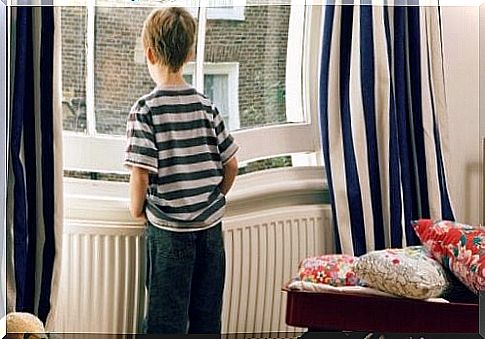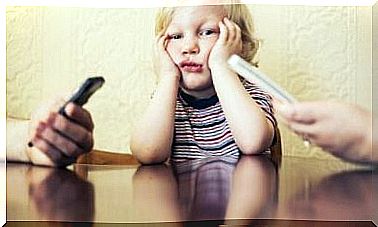Key Children: Children Who Are At Home Alone

Children who carry the house key around their neck or in their wallet are sometimes referred to as key children.
Key children have to unlock the front door themselves because nobody is waiting for them at home.
As this became more common, an entire generation of key children has grown up.
The concern for key children alludes to something very important for children: spending time with their parents. This is an important part of their psychological and physical development.
A generation of key children
Sometimes when parents want to combine family and work, they cannot spend as much time as they want with their children. This is becoming more and more common, especially in large cities.
Being left alone all day can lead to behavioral problems, obesity, depression, and difficulty expressing emotions, among other things .
Key children can also show physical symptoms. These include changed sleeping habits, loss of appetite, weight loss and gastrointestinal disorders.
As a result, school performance and behavior in school can also be influenced.
How do key children come about?
Here are some factors that are helping more and more children grow up as key children:
- The rise of the nuclear family: In the past, grandparents and other family members were around for care and support.
- The emancipation of women that has resulted in a large number of families where both parents work.
- The higher cost of living has made long hours a priority and a necessity. This is especially true if you also have to raise and feed children.
- The highly competitive job market is another factor that is pushing parents to stay longer in the office.
- The need for a university education to survive in the labor market means that parents have to save money for their children’s future.

What are the consequences for the key children?
Now we show the consequences of leaving children alone until late in the evening.
These are especially severe in children under the age of 12. It is a very important stage in children’s development.
1. fear
Key children can get lonely quickly and avoid social situations, stress, or conflict.
2. Panic attacks
Symptoms can be visual changes, such as slight hallucinations or deformation of real objects.
3. Adjustment disorder
Another consequence is that children are forced into roles that are inappropriate for their age. In response, the child may develop something called an adjustment disorder.
4. Independence
Since key children have less contact with their parents, they learn to cope on their own during the day. That means that they have more freedom and become more independent.
5. Exhausted parents
Parents of key children often come home exhausted at the end of the working day and do not have enough energy to talk to their children.
Mothers and fathers can even come home late at night while the children are asleep.
6. Loss of authority
In terms of the parent-child relationship, a lack of time together can cause children to lose respect for their parents’ authority.
7. Aggression
Key children can become aggressive or arrogant towards their parents or show rebellious behavior because there are no limits in everyday life.
8. Friendships
For many key children, friends play the role of family. Children who are home alone every day can get a lot of support from their friends.
It becomes problematic when children surround themselves with friends who are not good role models.
9. Eating habits
Children left alone learn to feed themselves. As a result, they have no fixed meal times and can eat unhealthily.
When children are left to their own devices, they eat more junk food.

10. Lack of affection
Ultimately, key children may not feel loved and cared for by their parents. This makes it harder for them to love or trust others.
Nowadays it can be necessary for both parents to work long hours. But parents can take steps to avoid the distant relationships characteristic of key children .
Build a strong bond with your child by communicating and sharing ideas. Take an active interest in their life so the child doesn’t feel neglected.









